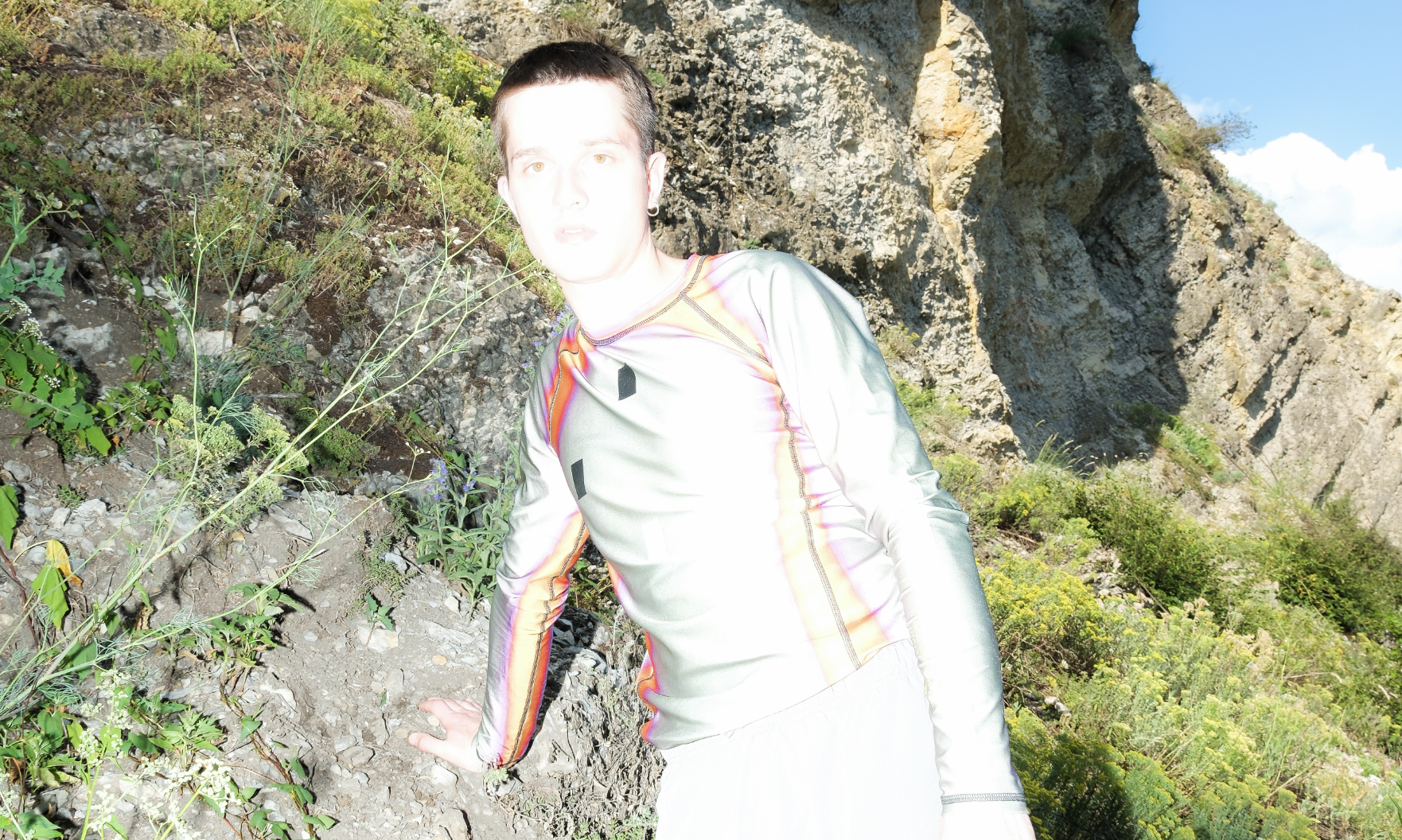
Andriy Kostyukov aka Andriy K. is a Kyiv-born and Prague-based producer and DJ. His work skilfully combines experimental club music and deep listening live performances.
When it comes to DJ sets, Andriy has established a signature sound that oscillates between trippy techno and bass club music. He is the co-organiser and founder of Motsion – one of the first musical events that began charitable activities in Kyiv after the start of the full-scale Russian invasion of Ukraine.
Can you tell us about your background? How did you get into music, and electronic music in particular?
I took a few classical guitar lessons when I was 11 and continued with bass and electric guitar during my teenage years. I played in several bands, starting with nu-metal (hehe) and eventually transitioning to trip-hop, shoegaze, and krautrock.
During my shoegaze phase, which marked the end of my guitar era, I focused on textures and sound design, making ambient music a natural fit for me. After that, I decided to produce electronic music on my own, sometimes collaborating on duo projects with like-minded people.
I gradually moved away from my instrumental/rock/psychedelic roots, creating more and more electronic tunes and performing live across Ukraine. In the beginning, I didn’t know how to DJ, but I learned over time.
In the last two years, I decided to combine everything I love and know, so I split my project into two vectors: Andriy K., which is about the listening experience, and cusoon dj, which focuses on club experiments and tools.
Your sound can be adapted to both listening and clubbing experiences – can you talk about the music you make and play? And the atmospheres that you create in your sets?
It’s all about rituals, tribalism, shamanism, and therapy sessions. The listening experience is therapeutic, with refreshing lyrics that I want to share. I love the ’90s, so I try to maintain that aesthetic and sound, but with a more futuristic vision and organic vibes. It’s like the taste of fresh air when you’re high in the mountains, or when you’re slowly sinking into the forest floor, completely enveloped by rich, earthy smells.
For the club experience, the main thing that I bring is a psychedelic connection between body and mind, with a touch of storytelling—sometimes dark, but not too much, just like in real life. In this case, I am the shaman who takes you by the hand and brings you into the ritual.
How important is listening to your practice?
Listening is very important for your mind, body, and soul; it’s not just about the music. These days, I don’t listen to much electronic music, but I do have two favourite mix shows for morning meditation and yoga. I love listening to instrumental music, pop, soul, R&B, and dub with vocals. So, I can say that the key is not to focus on just one genre.
What do you think has led to the popularity of listening events in the last few years?
The cycle is repeating itself. Fifteen years ago, people attended concerts much more than they went to clubs. Now, the dance scene, which has money, has become increasingly focused on ‘techno’ and ‘EBM’. But a lot of people are aware of this and want to explore a wider range of genres.
I think that COVID also played a role, because when you’re mostly at home, you start digging online and (hopefully) listening to a lot of different genres. From my perspective, we have the same crowd, and as the years go by, more and more people are discovering that they enjoy more chill vibes.
Additionally, listening to music paired with visuals creates a profound experience. It’s a natural progression for clubbers: after going through the cycle of techno -> bass -> dnb/breaks/leftfield/experimental, they eventually find that simply listening to music is very interesting—and it’s nice to get a good night’s sleep too.
You are also the co-organizer and founder of Motsion — “one of the first musical events that began charitable activities in Kyiv after the start of the full-scale Russian invasion of Ukraine”. Can you talk about this initiative?
Maria Kornieieva (AXT) and I organised our first event in May 2022 in a coworking space owned by friends in Kyiv. At that time, none of us knew what the future held, but we felt a strong sense of connection within our community. I also discovered the therapeutic “magic” of listening events.
Over the past two years, we have held more than 20 events across Europe, including in Turkey, Hungary, the Netherlands, and Germany.
It’s always a pleasure to see how the community enjoys the club nights or listening concerts—they always stay until the end.
You were born in Kyiv but are now based in Prague. How do you find the city and the music scene and how does it compare to Kyiv?
The local scene in Prague is quite unique. Artists here play a wide range of genres, and there’s usually something interesting happening every weekend.
I also want to give a big shout-out to the Czech DIY festivals—there are many fascinating events in the summer, very psychedelic and atmospheric, and highly recommended.
I don’t like to compare places, especially since Kyiv has changed so much since the war began. However, one thing that stands out for me in the Prague scene is the number of women who produce and perform live in experimental genres. I wish the same for Kyiv.
What are your current projects?
Right now, I’m focused on an upcoming ambient release that will be out on Oscilla. It’s an audiovisual project I created with an old friend, dedicated to ecological issues, particularly to the catastrophe in my home country, Ukraine. I hope we’ll all be able to attend this audiovisual concert series soon.
Meanwhile, some Motsion events will be happening across Europe soon. We’re excited to be returning to Kwia, a perfect venue for listening experiences.
Interview Lucia Udvardyova
Photo David Mathe